#book tumbr
Text
Inner Monologue Shitpost Breakdown A.K.A. Review of Chapter 2 of "A Court of Thorns and Roses"
Commence Chapter Two
Even though just a few minutes ago narrator gave us that whole concerning spiel about how her world has no color in it anymore, the moment something good finally happened her world is "a living painting" once again. This is textbook catastrophizing, and I will say it again: protagonist absolutely has BPD. I love this, because it makes her more relatable as a heroine. But also...seek therapy, please. There is a less compelling counter-argument to be made for the possibility that she's simply suffering hallucinations in color due to starvation and/or hypothermia, but overall I'm feeling confident about my prognosis.
In chapter one narrator foreshadowed her two sisters as these sort of...2D villains...but now she's walking into the house and catches their muffled talking from inside and she's like (paraphrasingly), "I don't actually need to hear what they're saying to know it's something stupid about like boys or ribbons" which is so cunty but I love it. Like, this sort of knee-jerk condescension where she minimizes them to silly, shallow, frivolous little idiots without even HEARING them...chef's kiss. It's this implication that our protagonist isn't such a black and white instrument of morality that makes her character more likable in my mind.
She extends this same flavor of contempt to their father in the very next paragraph, because it turns out he's also wildly incompetent, and gullible to boot. We learn that this is a combination of their family's unfortunate financial situation, a smattering of PTSD (courtesy of some kind of evil banker crony guys attacking and crippling him), and what reeks of depression-induced executive dysfunction. Dad has basically fucked off and given up, sisters are essentially useless.
Verdict: there's definitely some weaponized incompetence going on in this household, and everyone just assumes narrator is going to pick up the slack (she does). She also vaguely hints at the fact that she's only DOING it because she has to. Reader (me) is not surprised to hear this. Narrator takes promises very seriously, and is constantly burdened by this promise she made to their dying mother. Their dying mother knew to place this burden on narrator, because...well...quite frankly the rest of the household fucking sucks. Dad is fruitlessly chasing the "someday I'll be rich" dragon, courtesy of the book's real-world parallel of our capitalistic brainwashed poverty regime; he is doing little wood carvings no one fucking wants because he's a freelance whittler in a destitute village where nobody can AFFORD HIS SILLY CURIO CURIOSITIES. Sister Elain is pretty and brainless and probably just needs to marry a rich man with a big garden (she loves flowers). Obviously this one is Dad's favorite, which is just an extra sting to the narrator's piling list of injustices. Sister Nesta is...a cunt? There's a line about how she deliberately places Dad's cane out of his reach, which is funny but also, what the fuck? This could also be some manifestation of her just being really unsatisfied with his mediocre parenting, which is pretty understandable in retrospect.
This chapter is...better than the first. Thank the forgotten gods. Author struggles with the concept of nuance. This is less of an issue for the narrator, because the author overtells everything the narrator thinks and feels (to an extreme degree); but once we are introduced to characters whose perspectives we aren't given directly, it becomes a problem. For example, I know I'm not supposed to hate the narrator's sisters. The only reason I know this is because the narrator has explained to me in exact words that SHE doesn't hate them. But are they WRITTEN as irredeemable villains? Yes, absolutely. Can I forgive the fact that they don't notice the narrator is covered in blood, or offer to help with any of the meal prep, but immediately both jump to what she can buy for them with the money she gets from the wolf pelt? No. But I get the sense that I'm supposed to, in that EVENTUALLY the narrator will insist that I root for them.
If the author had chosen to make the sisters CHILDREN, I would feel a lot differently here, because, despite being the youngest child, the narrator is shouldering the brunt of the household's emotional and financial needs. She promised her dying mother she would play mother once she was gone, which...is not fair to her, obviously...and now I SEE why she took 3 years to leave the forest and has a branching inner monologue that rivals Homer's Odyssey and a very pronounced, undiagnosed borderline personality disorder. They do SEE her as the mother of the household. But considering the narrator is 19, and they are both OLDER than she is, their lack of empathy just makes them look like fucking monsters. Do I hate them? Yes, I've been urging narrator to burn her house down with her entire family inside since I started reading this chapter.
I'm thinking there is probably some significance to the faerie wards on the threshold, but I also just generally like the implication that even in this world of forgotten gods you still get a bit of good old-fashioned fundamentalist inspired fear-mongering. I also like that this is lore-accurate based on the way Celtic fairy faith was very much driven by a similar fear. Families were constantly seeking ways to defend themselves against the fae, be it with religious symbols or iron or salt or open scissors above a newborn's crib. This is why you don't keep welcome mats on the doorstep, this is why you need protection runes and throw your infant in the fireplace if you suspect it might be a faerie changeling. Some of it seems so silly, yes, but it does conjure up a sense of real fear, and how it is deeply-ingrained into the MORTAL side of this book's world, but we also see where the protagonist deliberately separates herself from the DELUSION of it. She's like, "Yeah these wards are obviously fake, everyone knows we don't have magic, we can't even hope to defend ourselves against the power of the High Fae." Protagonist is a realist; she is not indoctrinated by the false sense of security provided by these carvings on the threshold. It is very significant that narrator CHOOSES not to weaponize this secular understanding of the world around her, she CHOOSES to let her father live in this naive bubble he's created for himself. Just like she acknowledges the blind, shallow, selfish nature of her sisters but CHOOSES not to confront and unpack those issues. It's the most multi-faceted element we've gotten of this heroine thus far, because we know now that only part of this is out of kindness and empathy. The other part of her ENJOYS the advantage she has over her family members. They ARE absolutely inept, incompetent, naive, shallow, blind, shackled sheep in a pen, and narrator gets some small satisfaction from that. She is smarter than they are. She is more responsible than they are. She spares them the burden of being held to a higher standard because it keeps her on this pedestal, and the resulting sense of self-worth is literally ALL she has, that is her ONLY sense of self-worth, no matter how she may resent it. These two halves of her personality are held together by obligation and guilt. It's not that she ENJOYS playing mother to a grown man and two grown women; she feels like she has to, and at this point, it's all she knows HOW to do.
Narrator’s name is Feyre. I had a hunch because I am both clever and wise, but it’s nice to finally receive confirmation. Author makes certain to include pronunciation directly after, because author realizes most readers will not skip to the pronunciation guide at the end of the book.
In short, things I do like: The deepening of the story’s morally gray protagonist, the impending burden of responsibility versus guilt, the name “Feyre,” a deeply fearful human settlement built on the outskirts of faerie territory, whose only line of defense from their hostile neighbors is…ineffectual carvings in the windows (and probably like bits of iron or something), details like the brassy hair narrator shares with her sisters—juxtaposed by the disparity of things like eye color, and how her sisters and father all have a “clean” face—while she comes home, the contrarian, covered in blood,
Things I don’t like: lack of effectual character development for narrator’s sisters and father, the way two people in the same two-room house asked narrator the same dumb question about “where she got” the two animals she very obviously hunted and skinned herself, author’s hyperbolic over-use of adjectives, and this sentence: “My father’s deep rumble came from the fire.”
#booktok#book tumbr#bookworm#acotar#a court of thorns and roses#book review#i'm reading the faerie smut#i'm reviewing the faerie smut#fantasybooktok#fantasy books#romance books#super candid super honest review of this book everyone else has already read
2 notes
·
View notes
Text

Flora of Middle-Earth.
Ella Webb
#ella webb#artist on tumblr#lotr books#lotr fanart#tolkien#botany#nature#artist on tumbr#illustration
105 notes
·
View notes
Text
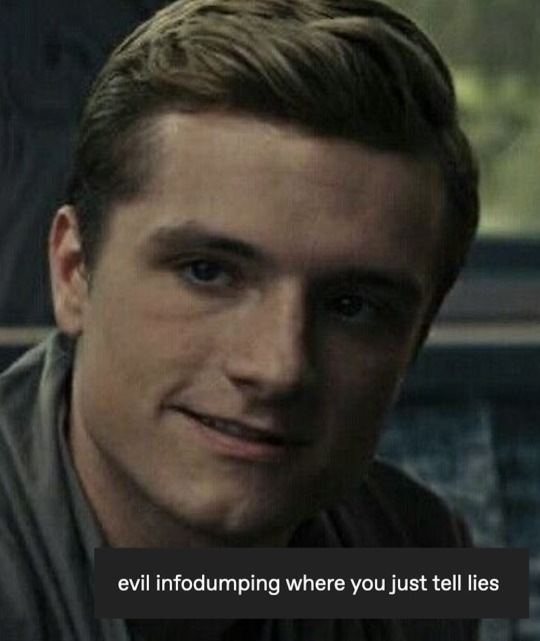

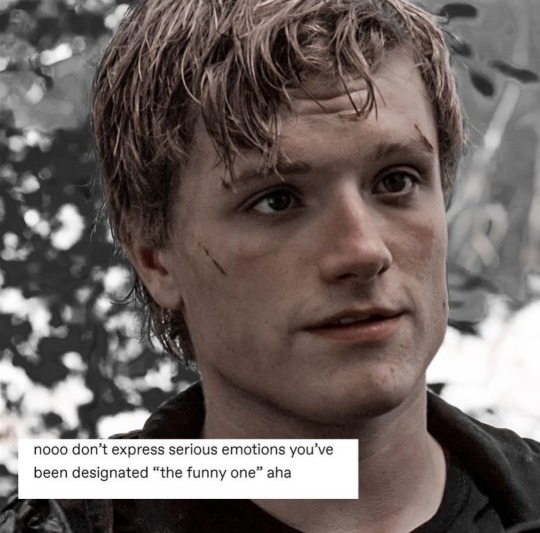
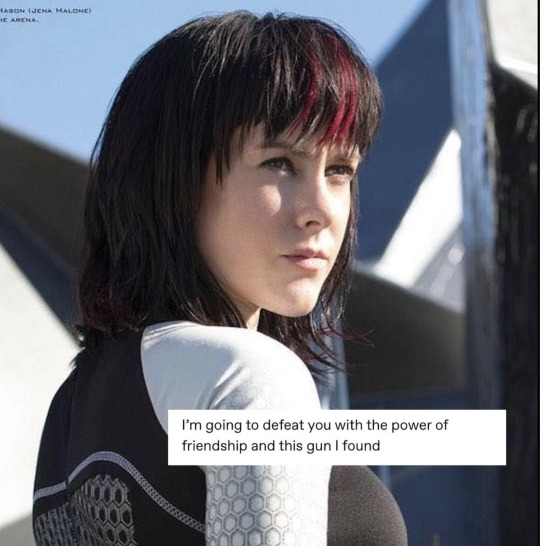
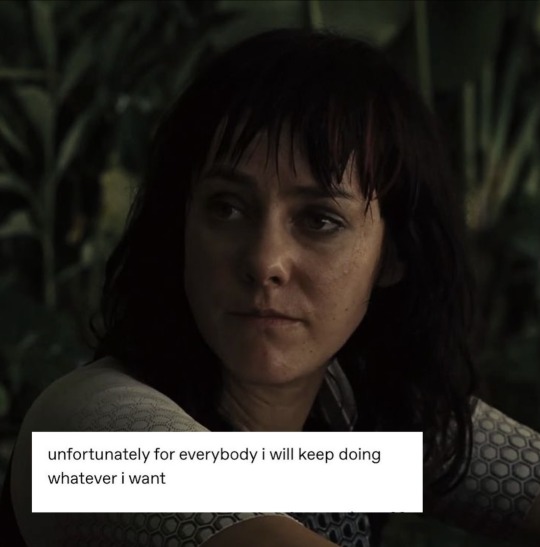
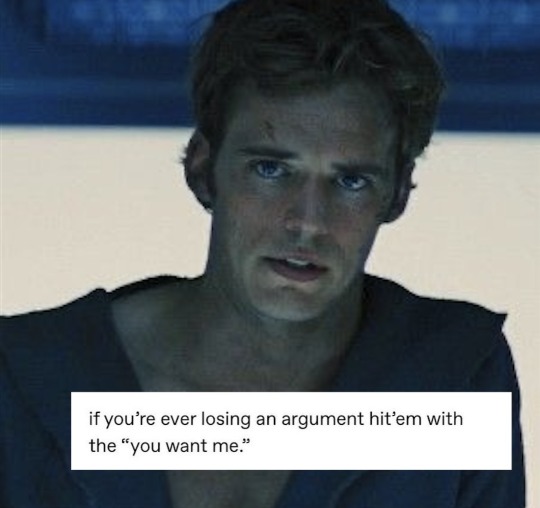
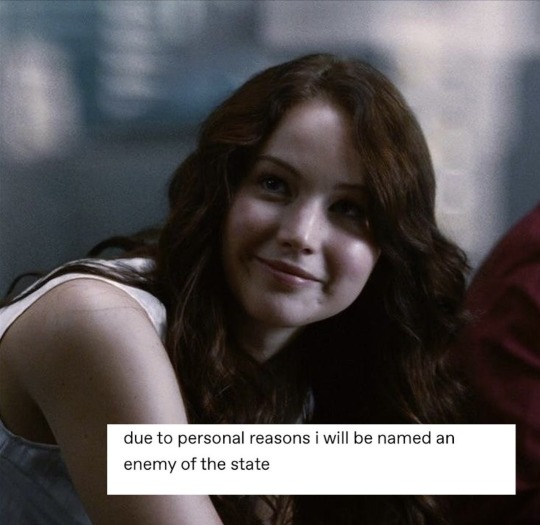
#the hunger games#hunger games movies#hunger games books#hunger games series#katniss everdeen#katniss and peeta#peeta mellark#peeta#finnick odair#thg finnick#thg#thg series#johanna mason#i’m in love with johanna and finnick#incorrect quotes#hunger games incorrect quotes#tumbr#text post
151 notes
·
View notes
Text
When I enter a fandom thinking I'm gonna be obsessed with the main couple like everyone else but instead I get "shy autistic emo sopping wet queer loser side character brainrot syndrome" for the next few months/years
#yes this about nico and hunter leave me alone#also alex fierro because ✨alex✨#pjo#nico di angelo#toh#toh hunter#hunter noceda#alex fierro#mcga#brainrot#fandom#queer characters#or should I say ✨queer characters✨#man if only my tumbr era and my hades era overlapped there would be so much brainrot on here#thanatos hades#hades game#seriously everyone over here with their cute and popular main couple and im in the corner sobbing and hugging my traumatised gays#disney+#books#characters#queer#lityerses#toa#hoo#leo valdez#the tags once again being an accurate representation of my neurospiciness#also yeah the main couples like lumity and percabeth are great and all but please consider#the traumatised gay loser rocking back and forth in the corner
195 notes
·
View notes
Text
Something zoomers and less informed millennials struggle with is that support for Israel has been baked into American society for decades and really only in the last ten years has that meaningfully changed.
The process has inarguably been going on longer than that, but has been most obvious to the lay observer for about a decade. Particularly, Trump made Israel a partisan issue. Trump brought to America the vicious hate of blood and soil Zionism. It's hard to fully encapsulate how much damage Trump's support for Israel did to the works of hasbara. Honestly, it's depressing.
More critically still, Christian Zionism—a necessarily antisemitic belief—has become the primary form of vocal support for the Israeli state. I don't particularly believe the average gentile is reacting to the plenary evil of the Evangelical beyond how loathsome they are or, indeed, their antisemitism in any meaningful way, but as with the reaction to Trump, at least we've gotten here.
Prior to around the turn of the century, American support for Israel was part of a cultural and political reaction to the Holocaust. Even different from a lot of powers in Europe that had found in a Jewish state an answer to their Jewish question, the United States was among several nations to make a blunt, direct statement about allyship with Israel as a deviation from historical antisemitism locally and abroad. Now, all but our most vicious antisemites claim to be Zionists and, vitally, Israel embraces them.
More notable still is how a reified, non-ideological form of anti-Zionism has taken root in American society. This, in particular, is a very new development.
Truthfully, I am deeply suspicious of any gentile who calls themselves an anti-Zionist. Anti-Zionism and Zionism both are ideologies with historical roots nearly two centuries old. Anti-Zionism is not merely a dislike of revanchism and far-right nationalism—things one should not need a deeper body of thought to dislike.
Nonetheless, where gentile anti-Zionism was once primarily a form of thinly-veiled antisemitism (it still is in many cases), it has seen more and more use by people seeking a specific term for their hate of state violence, which has further crystallized the change in the perception of Israel.
This, not just some mindless love of death, is why there is such a notable cleaving between the generations on the issue of Israel in the US.
#Israel#Anti-Zionism#Zionism#it's obviously more complicated than this#but I am not jamming out a book on tumbr dot fart with my thumbs#if I'm being honest#Americans shedding a reaction to the evils of the Holocaust is absolutely a bad thing for American Jews
10 notes
·
View notes
Text
Ven toma mi mano, no te diré que será perfecto porque no soy perfecta, pero te ofrezco mi cariño, te ofrezco mi lealtad, te comparto mi corazón, mi espacio y universo.
#instagood#instalove#lovers#amor#instamood#pensamientos#lectores#lectora#amorpropriosempre#frasi libri#i love you#amores#tumbr#tbt#inspirasi#insomnio#inspirational quotes#quotes#booksbooksbooks#book quote#bookstore#inspiración#inspiration#instagram#instaart#paper art#words words words#my words#my heart ❤️#my text
8 notes
·
View notes
Text
Boşvermeyi öğren artık, hayatındaki herkesin kalması gerekmiyor.
#bookworm#book blog#reading#books#books & libraries#sözler#fypシ#artists on tumbr#writers on tumblr#tumblr#siyah
13 notes
·
View notes
Text
When Vincent Van Gogh said, "And then I have nature and art and poetry, and if that's not enough, what is enough?" and when Bansky said, "Art should comfort the disturbed and disturb the comfortable." and when Friedrich Nietzsche said, "We have art in order not to die of the truth."
#vincent van gogh#friedrich nietzsche#bansky#dark acadamia aesthetic#literature#dark academia#artists on tumblr#classic literature#love#writers on tumblr#literary quotes#book quote#romanticism#art#van gogh#art on tumbr#poetry#classic lit quotes#literature quotes#quoteoftheday#dead poets society#kill your darlings#the secret history#poetic#poems and quotes#writers and readers#reading#book quotes#bookstagram#booknerd
34 notes
·
View notes
Text

— Louise Glück Epithalamium from "Descending Figure.”
#poetries#aesthetic#looks over books#booksbooksbooks#bookaholic#bookish#book quotes#books aesthetic#writers on tumbr#dark academia#tumblrstuff#tumblrpost#tumblr trends#artists on tumblr#tumblrthings
7 notes
·
View notes
Text
Why is everyone so negativ, toxic and annoying on other social media plattforms ?
I just can't vibe with anyone like i vibe on tumblr ...that's why i stay here forever i guess
#This if mostly for people who bash against Jaskier being bi#And all those people who say season 3 isn't close to the books ....have you read them?#And all those “oh the show died when herny left”#No it's doesn't#Ugh#Tumbr = found home#Personal#The-not-so-silent-back-up
8 notes
·
View notes
Text

Finished this and hmmmm thoughts under the cut. Spoilers too because I'm feeling chatty and full of rambles.
Not sure how much sense this will make. I mostly want to type my frustrations out so...
It's been a while since I was so disappointed in a book. This was an impulse purchase after remembering all the talk about the movie. Maybe the movie was better, maybe the hype got to me but wow I ended up giving this comic 2.5 stars after the beginning had me thinking 4. At the end of the day I thought the choices felt way too forced and the plot holes were abundant. I'm frustrated because I can see so much potential.
Why did the kids have to choose at all ? Let alone why choose so early? The dad seemed to be able to live as human and wolf so???
Also wow the girls must be good/conform but boys get to Be was strong in this. Really felt that the "nail that stick out gets hammered down" with Yuki. Yes, some girls stop being tom boys but the way the comic went makes me sad.
Also the hybrid forms got really cartoon-y and I wasn't a fan even if the cutsie was fun earlier in the story. After the puppy days the design felt a bit uncanny valley.
The romance at the start was adorable and the following death was sad in proportion to that. But once the kids started going to school the story went off the rails for me. Way to many time skips and actions with no real follow through *frustrated screeching*
And the end?!?!?!? Nope. Not a fan at all. And I'm sad because the start was Good.
I might even return the book. And I never do that after reading. Mostly because I rarely read so quickly after buying but still.
*annoyed and grumpy noises*
#not even tagging this with any of the book tags#that would be rude#this isn't a review its frustrated spew#Not out of void but out of chaos#also making sure no one can reblog this#oh wait lets edit the title out of my rambling because tumbr search function it ridiculous
2 notes
·
View notes
Text
"I had thought of suicide when I was much younger, as, possibly, we all have, but then it would have been for revenge, it would have been my way of informing the world how awfully it had made me suffer. But the silence of the evening, as I wandered home, had nothing to do with that storm, that far-off boy. I simply wondered about the dead because their days had ended and I did not know how I would get through mine."
-Giovanni's Room by James Baldwin
#dark academia#light academia#cottage core#dark acadamia aesthetic#excerpts#dark fantasy#fragments#poetry#books & libraries#home#lit#text post#poets on tumbr#romanticism#classic lit#classic aesthetic#aesthetic#classic literature#literature#books and literature#sadness#choatic academia quotes#choatic academia#spilled ink#spilled love#spilled thoughts#spilled words#words#english literature#novels
34 notes
·
View notes
Note
I think you would enjoy the show Lockwood&co
oh my god you will never guess what I just finished watching
#i havnt opened tumbr fully in a few days#but i did just finish lockwood&co and then saw this#it was such a good show omg#i need a s2 cause that cliff hanger was just amazing#its based off books right? do you know if they are worth reading?#lockwood & co
5 notes
·
View notes
Text
"Öldükten sonra insanların seni ne kadar çabuk unutacağını görseydin, hayatını başkalarını mutlu etmek için harcamazdın."
#sözler#siyah#writers on tumblr#tumblr#artists on tumbr#bookworm#book blog#reading#books#kitap alintilari#books & libraries#gece mavisi#fypシ
16 notes
·
View notes
Text

It’s been some time, but I still had the idea to transform the illustrations of the Swordtember challenge in a true book!
So, finally, here’s the cover for “The Swordbearer”, soon available!
I have a ton of work still to do on it, but I’m hyped, I hope you all will like it! ⚔️
#swordtember#swordtember2022#book cover#sword#swordbearer#cover#illustrated book#art#illustration#fantasy illustration#drawing#digital art#clip studio paint#artists on tumbr#fantasy#fantasy art#fantasy world#drawing challenge#timelapse#work in progress#wip
4 notes
·
View notes
